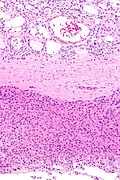Succinate dehydrogenase-deficient renal cell carcinoma
(Redirected from SDH-RCC)
Jump to navigation
Jump to search
| Succinate dehydrogenase-deficient renal cell carcinoma | |
|---|---|
| Diagnosis in short | |
 SDH-deficient renal cell carcinoma (left of image). H&E stain. | |
|
| |
| LM | eosinophilic cells with clear (flocculent) cytoplasmic inclusions, round nuclei with mildly granular chromatin pattern, intratumoural mast cells, solid architecture |
| LM DDx | renal oncocytoma, chromophobe renal cell carcinoma, clear cell renal cell carcinoma, other renal tumours with eosinophilic cytoplasm |
| IHC | SDHB -ve, CK7 -ve, CD117 -ve, PAX8 +ve, CA9 -ve |
| Gross | mass lesion, commonly cystic |
| Grossing notes | partial nephrectomy grossing, total nephrectomy for tumour grossing |
| Site | kidney - see kidney tumours |
|
| |
| Syndromes | familial pheochromocytoma and renal cell carcinoma syndrome |
|
| |
| Prevalence | extremely rare |
| Prognosis | usually good prognosis (limited data) |
| Clin. DDx | other kidney tumours |
Succinate dehydrogenase-deficient renal cell carcinoma, also succinate dehydrogenase renal cell carcinoma (abbreviated SDH-RCC), is a very rare type of renal cell carcinoma.
It is in the 2016 World Health Organization classification of renal neoplasia.
General
- Extremely rare - estimated to represent up to 0.2% of renal cell carcinomas.[1]
- May be assocated with paraganglioma and familial, as with several SDH mutations.[2]
- Primarily described with a SDHB mutation.[3]
- Usually good prognosis.
Gross
- Mass lesion - commonly cystic.
Microscopic
Features:[3]
- Eosinophilic cells with clear (flocculent) cytoplasmic inclusions. ‡
- Round nuclei with mildly granular chromatin pattern.
- Intratumoural mast cells - usu. not prominent.
- Solid architecture - typical.
Notes:
- ‡ Occasional cells may look like signet ring cells.
- Typically low ISUP nucleolar grade.
- May be sarcomatoid.
DDx:
- Renal oncocytoma - granular cytoplasm.
- Chromophobe renal cell carcinoma.
- Clear cell renal cell carcinoma.
- Other renal tumours with eosinophilic cytoplasm.
Images
www:
- SDHB-RCC - poor quality histology image (nih.gov).[4]
- SDHC-RCC (nih.gov).[4]
- SDH-deficient RCC (nature.com).[3]
Case 1
Case 2
Case 3
Pictures demonstrates the variability between different regions of the tumour:
IHC
Features:
- SDHB -ve (11 of 11 cases[3]).
- Normal tubules +ve.
- May be (pseudo)negative in clear cells (as few mitochondria).
- CD117 -ve - important.
- CA9 -ve.
Others:
- PAX8 +ve.
- EMA +ve (10/10[3]).
- CK7 -ve (1 +ve/35[1]).
- AE1/AE3 -ve/+ve (4 +ve/10[3]).
- CK20 -ve.
- CD10 usually focal (most common) or -ve.[1]
See also
References
- ↑ 1.0 1.1 1.2 Gill, AJ.; Hes, O.; Papathomas, T.; Šedivcová, M.; Tan, PH.; Agaimy, A.; Andresen, PA.; Kedziora, A. et al. (Dec 2014). "Succinate dehydrogenase (SDH)-deficient renal carcinoma: a morphologically distinct entity: a clinicopathologic series of 36 tumors from 27 patients.". Am J Surg Pathol 38 (12): 1588-602. doi:10.1097/PAS.0000000000000292. PMID 25025441.
- ↑ Hernandez, KG.; Ezzat, S.; Morel, CF.; Swallow, C.; Otremba, M.; Dickson, BC.; Asa, SL.; Mete, O. (Mar 2015). "Familial pheochromocytoma and renal cell carcinoma syndrome: TMEM127 as a novel candidate gene for the association.". Virchows Arch. doi:10.1007/s00428-015-1755-2. PMID 25800244.
- ↑ 3.0 3.1 3.2 3.3 3.4 3.5 3.6 Williamson, SR.; Eble, JN.; Amin, MB.; Gupta, NS.; Smith, SC.; Sholl, LM.; Montironi, R.; Hirsch, MS. et al. (Jan 2015). "Succinate dehydrogenase-deficient renal cell carcinoma: detailed characterization of 11 tumors defining a unique subtype of renal cell carcinoma.". Mod Pathol 28 (1): 80-94. doi:10.1038/modpathol.2014.86. PMID 25034258.
- ↑ 4.0 4.1 4.2 Ricketts, CJ.; Shuch, B.; Vocke, CD.; Metwalli, AR.; Bratslavsky, G.; Middelton, L.; Yang, Y.; Wei, MH. et al. (Dec 2012). "Succinate dehydrogenase kidney cancer: an aggressive example of the Warburg effect in cancer.". J Urol 188 (6): 2063-71. doi:10.1016/j.juro.2012.08.030. PMID 23083876.
External links
- Succinate dehydrogenase-deficient renal carcinoma (cancerdxpathology.org.au) - virtual slides from Gill.
















